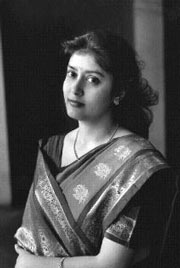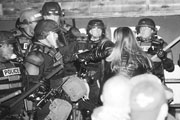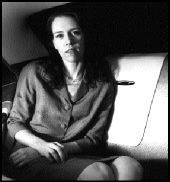FOR EVERY J.K. Rowling of the world, there are countless other would-be writers toiling night after night over failed manuscript after failed manuscript, using rejection notes for wallpaper. At times, the road to success can seem as arbitrary as winning the lottery, but after talking with two authors recently published for the first time, it’s clear there are universal lessons.
Indu Sundaresan, a lovely native of India who wears a sari in her book-jacket photo but in person looks as American as Oprah, talked about her process over lunch at her favorite Indian restaurant, Kanishka in Redmond. Her debut book is The Twentieth Wife, a historical novel set in the 16th-century Mughal Empire. Her first advice: Find an interesting topic.
But before you do that, you need the courage to declare yourself a writer, albeit unpublished. “In my family, writing was not considered a legitimate profession,” she says. “If you weren’t a doctor or an engineer, you were considered to be goofing around.”
So she earned a master’s in economics and moved to Bellevue with her husband, but she couldn’t find a job in her field. Finally, she says, “I bought a computer to be a novelist.” And “several computers and several novels later,” The Twentieth Wife hit the racks. She got the idea when, feeling homesick, she was reading Indian history and came across the name Mehrunnisa, the 20th and last wife of Emperor Jahangir, father of Khurram, who built the Taj Mahal to honor his beloved wife Arjumand.
Captivated by the story, she launched into extensive research of a subject not well known in the United States. Sundaresan remembers realizing there’s a common misconception in this country that the Taj Mahal is a palace. “I never understood that expression in America ‘It’s not the Taj Mahal, but it’s home,'” she says with a laugh. “I always wondered why would you want to compare your home to a tomb.”
When she sat down to write, she used many techniques of method actors to get into the mood. “Sometimes cold, rainy Seattle is not going to get you there when you’re trying to write about India,” she says, so she cranks up the heat. “I find physical triggers very helpful when writing—the smell of incense, a cup of chai.”
Eight years passed before Sundaresan finished The Twentieth Wife. “In retrospect it seems heroic, but it didn’t happen that way at the time. I took a lot of classes at Bellevue Community College.” Those classes helped her develop a critique group, which, she stresses, has been invaluable. “A good critique group will pat you on your back—that is really important—but they will also tell you what needs to be changed. You learn what is constructive and what isn’t.”
Especially for first-time writers, she thinks, this kind of help is essential. “I’m glad to have a community I can go to before sending it off.”
She’s already finished the sequel to the book, due out next year, and is currently working on a novel set in 1940s India. Now a writer in more than her own mind, she reflects, “The hardest thing about writing is getting noticed for your work, but it’s very rewarding when you are.”
WHILE SUNDARESAN found her writing voice by exploring ancient history, Alexandra Fuller found hers by exposing her family’s darkest secrets. The Jackson Hole-based 33-year-old worked at all manner of jobs—waitress, office manager, river-rafting guide, copy editor—and had two children while writing three or four failed books that fictionalized her experiences growing up in Zimbabwe (then Rhodesia). “Then I had an epiphany,” she says. “Tell the damn truth.” Over the plainest tea at the Online Coffee Company (she reacts to the suggestion of Earl Grey like a slap in the face), she says, “I wrote around this for so long.” Her family stories of mental illness, alcoholism, childhood death, and racism had a compassionate side, but, she remarks, “I knew it was funny, but it wasn’t funny as fiction.”
In just six weeks the wonderful Don’t Let’s Go to the Dogs Tonight poured out like the Zambezi River tumbling over Victoria Falls. “I found my voice,” she says with still-intense relief. It’s a preternaturally wise but very real child’s voice, quite like Scout in To Kill a Mockingbird. Her wide-eyed honesty allows her to address incredibly touchy political and social issues in a way that enables readers to get a feel for walking around in her nearly always-bare feet for a while. “I hope it comes across that I’m a white African, and all I can do is occupy the space I’m in right now with as much compassion as possible,” she says. “In a free society, being politically correct cripples the honesty in literature.”
The new American citizen is planning a move to Tanzania—and a sequel. “It’s more about me,” she says with a grin, now fully comfortable with her subject.








